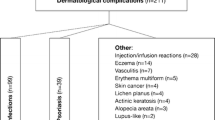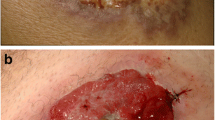Abstract
Background
Tumor necrosis factor (TNF) antagonists used for the treatment of inflammatory bowel disease (IBD) have been associated with the development of psoriasiform skin lesions. We assessed the demographic and clinical characteristics associated with and outcomes of patients with anti-TNF-induced psoriasiform lesions.
Methods
Patients with Crohn’s disease (CD) and ulcerative colitis (UC) receiving treatment with anti-TNF therapy (infliximab, adalimumab, or certolizumab pegol) at a tertiary referral center were identified using an IRB-approved clinical data repository. Patients that developed psoriasiform skin lesions after initiation of anti-TNF therapy were included as cases. A group of anti-TNF-treated patients without drug-related psoriasiform lesions were identified as controls. The association between demographic and clinical variables and psoriasiform lesions was assessed using Chi-square analyses and multivariable logistic regression.
Results
Five hundred twenty-one patients with IBD undergoing treatment with anti-TNF therapy were identified; of these, 18 (3.5 %) had psoriasiform lesions (16 CD and 2 UC). Seventy-two patients were identified as controls. Lesions developed a mean of 58 weeks (range 4–240 weeks) after starting anti-TNF therapy. The majority of patients were female and Caucasian (63 and 78 %, respectively). Thirty-nine percent of patients had upper tract disease location. Forty-five patients (50 %) were current or former smokers. Location of psoriasiform lesions included palmo-plantar (53 %), trunk (47 %), and scalp (53 %), with 88 % reporting involvement of ≥2 locations. Treatment of psoriasiform lesions was instituted with topical therapy in eight patients and systemic therapy (± phototherapy) in five patients. Discontinuation of anti-TNF therapy was recommended in nine patients (50 %); of those, three were retreated with a second anti-TNF agent and all had recurrence of psoriasiform lesions. When adjusted for multiple variables, upper GI tract disease was significantly associated with psoriasiform lesions.
Conclusions
Anti-TNF-induced psoriasiform lesions developed in 3.5 % of patients with IBD at a tertiary referral center. Similar to prior published studies, most patients were female, had involvement of the palmo-plantar and scalp regions, and did not have severe IBD activity. The presence of upper tract disease was associated with the development of psoriasiform lesions. Skin lesions led to discontinuation of anti-TNF therapy in 50 % of patients. Based upon these results, IBD providers should educate patients about this adverse effect, refer to dermatology for treatment, and discuss alternative IBD therapeutic options early if a severe psoriasiform rash develops.

Similar content being viewed by others
References
Loftus CG, Loftus EV, Harmsen WS, et al. Update on the incidence and prevalence of Crohn’s disease and ulcerative colitis in Olmsted County, Minnesota, 1940–2000. Inflamm Bowel Dis. 2007;13:254–261.
Lichtenstein GR, Yan S, Bala M, Blank M, Sands BE. Infliximab maintenance treatment reduces hospitalizations, surgeries, and procedures in fistulizing Crohn’s disease. Gastroenterol. 2005;128:862–869.
Lindsay JO, Chipperfield R, Giles A, Wheeler C, Orchard T. A UK retrospective observational study of clinical outcomes and healthcare resource utilisation of infliximab treatment in Crohn’s disease. Aliment Pharmacol Ther. 2013;38:52–61.
Abraham NS, Richardson P, Castillo D, Kane SV. Dual therapy with infliximab and immunomodulator reduces one-year rates of hospitalization and surgery among veterans with inflammatory bowel disease. Clin Gastroenterol Hepatol. 2013;11:1281–1287.
Peyrin-Biroulet L, Deltenre P, de Suray N, Branche J, Sandborn WJ, Colombel J-F. Efficacy and safety of tumor necrosis factor antagonists in Crohn’s disease: meta-analysis of placebo-controlled trials. Clin Gastroenterol Hepatol. 2008;6:644–653.
Sfikakis PP, Iliopoulos A, Elezoglou A, Kittas C, Stratigos A. Psoriasis induced by anti tumor necrosis factor therapy: a paradoxical adverse reaction. Arthritis Rheum. 2005;52:2513–2518.
Harrison MJ, Dixon WG, Watson KD, et al. Rates of new-onset psoriasis in patients with rheumatoid arthritis receiving anti-tumour necrosis factor alpha therapy: results from the British Society for Rheumatology Biologics Register. Ann Rheum Dis. 2009;68:209–215.
Kip KE, Swoger JM, Grandinetti LM, Barrie AM 3rd, Greer JB, Regueiro MD. Tumor necrosis factor antagonist-associated psoriasis in inflammatory diseases: an analysis of the FDA adverse event reporting system. Inflamm Bowel Dis. 2013;19:1164–1172.
Lennard-Jones JE. Classification of inflammatory bowel disease. Scand J Gastroenterol Suppl. 1989;170:2–6; discussion 16–19.
Silverberg MS, Satsangi J, Ahmad T, et al. Toward an integrated clinical, molecular and serological classification of inflammatory bowel disease: report of a Working Party of the 2005 Montreal World Congress of Gastroenterology. Can J Gastroenterol 2005;19:5–36.
Afzali A, Wheat CL, Hu JK, Olerud JE, Lee SD. The association of psoriasiform rash with anti-tumor necrosis factor (anti-TNF) therapy in inflammatory bowel disease: a single academic center case series. J Crohn’s Colitis. 2014;8:480–488.
Guerra I, Algaba A, Pérez-Calle JL, et al. Induction of psoriasis with anti-TNF agents in patients with inflammatory bowel disease: a report of 21 cases. J Crohn’s Colitis. 2012;6:518–523.
Parisi R. Global epidemiology of psoriasis: a systematic review of incidence and prevalence. J Investig Dermatol. 2013;133:377–385.
Icen M. Trends in incidence of adult onset psoriasis over three decades: a population based study. J Am Acad Dermatol. 2009;60:394–401.
Wolk K. Excessive body weight and smoking associates with a high risk of onset of plaque psoriasis. Acta Dermato Venereol. 2009;89:492–497.
Rahier J-F, Buche S, Peyrin-Biroulet L, et al. Severe skin lesions cause patients with inflammatory bowel disease to discontinue anti-tumor necrosis factor therapy. Clin Gastroenterol Hepatol. 2010;8:1048–1055.
Denadai R, Teixeira FV, Steinwurz F, Romiti R, Saad-Hossne R. Induction or exacerbation of psoriatic lesions during anti-TNF-α therapy for inflammatory bowel disease: a systematic literature review based on 222 cases. J Crohn’s Colitis. 2013;7:517–524.
Shmidt E, Wetter DA, Ferguson SB, Pittelkow MR. Psoriasis and palmoplantar pustulosis associated with tumor necrosis factor-α inhibitors: the Mayo Clinic experience, 1998 to 2010. J Am Acad Dermatol. 2012;67:e179–e185.
Skroza N, Proietti I, Pampena R, et al. Correlations between psoriasis and inflammatory bowel diseases. BioMed Res Int 2013;2013:1–8.
Barthel C, Biedermann L, Frei P, et al. Induction or exacerbation of psoriasis in patients with Crohn’s disease under treatment with anti-TNF antibodies. Digestion. 2014;89:209–215.
Huang V, Dhami N, Fedorak DK, et al. 3 infliximab trough levels are correlated with infliximab-associated adverse events. Gastroenterol. 2014;146:S-1.
Protic M, Münger C, Seibold F. Sa1267 psoriasis induced by anti TNF treatment in patients with inflammatory bowel disease—a single center study. Gastroenterol. 2014;146:S-247–S-248.
Cullen G, Kroshinsky D, Cheifetz AS, Korzenik JR. Psoriasis associated with anti tumour necrosis factor therapy in inflammatory bowel disease: a new series and a review of 120 cases from the literature. Aliment Pharmacol Ther. 2011;34:1318–1327.
Berth-Jones J. A study examining inter- and intrarater reliability of three scales for measuring severity of psoriasis: Psoriasis Area and Severity Index, Physician’s Global Assessment and Lattice System Physician’s Global Assessment. Br J Dermatol. 2006;155:707–713.
Mattozzi C. Psoriasis: new insight about pathogenesis, role of barrier organ integrity, NLR/CATERPILLER family genes and microbial flora. J Dermatol. 2012;39:752–760.
Di Cesare A. The IL-23/Th17 Axis in the Immunopathogenesis of Psoriasis. J Invest Dermatol. 2009;129:1339–1350.
Collamer AN, Battafarano DF. Psoriatic skin lesions induced by necrosis factor antagonist therapy: clinical features and possible immunopathogenesis. Semin Arthritis Rheum. 2010;40:233–240.
Fiorino G, Danese S, Pariente B, Allez M. Paradoxical immune-mediated inflammation in inflammatory bowel disease patients receiving anti-TNF-α agents. Autoimmun Rev. 2014;13:15–19.
Włodarczyk M, Sobolewska A, Wójcik B, Loga K, Fichna J, Wiśniewska Jarosińska M. Correlations between skin lesions induced by anti-tumor necrosis factor-α and selected cytokines in Crohn’s disease patients. World J Gastroenterol. 2014;20:7019–7026.
Conflict of interest
Raymond K. Cross, MD, MS, has a research grant from Abbvie, Inc. He has received income from consulting and participated in advisory boards with Abbvie Inc., Janssen, and Takeda Pharmaceuticals International, Inc. Leyla J. Ghazi, MD, has participated in advisory boards for Abbvie, Inc.
Author information
Authors and Affiliations
Corresponding author
Rights and permissions
About this article
Cite this article
George, L.A., Gadani, A., Cross, R.K. et al. Psoriasiform Skin Lesions Are Caused by Anti-TNF Agents Used for the Treatment of Inflammatory Bowel Disease. Dig Dis Sci 60, 3424–3430 (2015). https://doi.org/10.1007/s10620-015-3763-0
Received:
Accepted:
Published:
Issue Date:
DOI: https://doi.org/10.1007/s10620-015-3763-0




